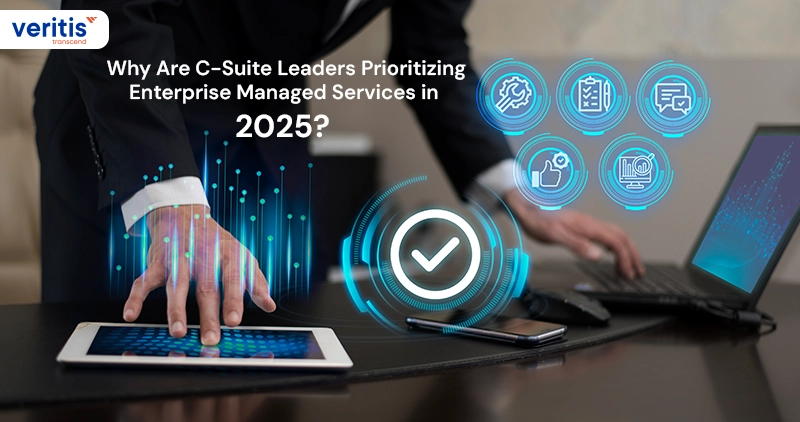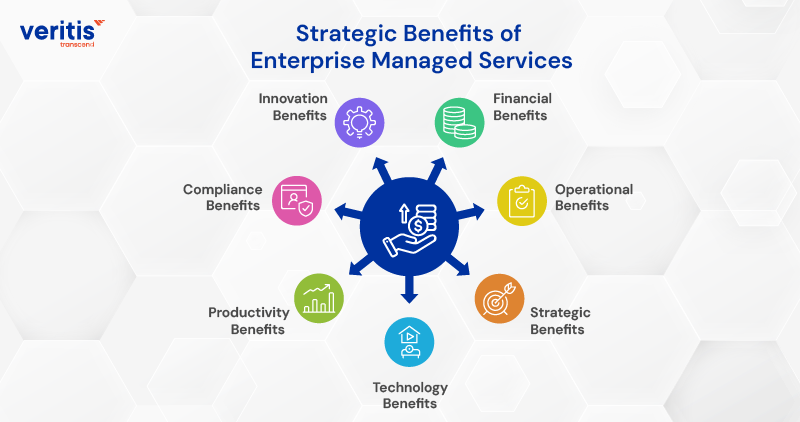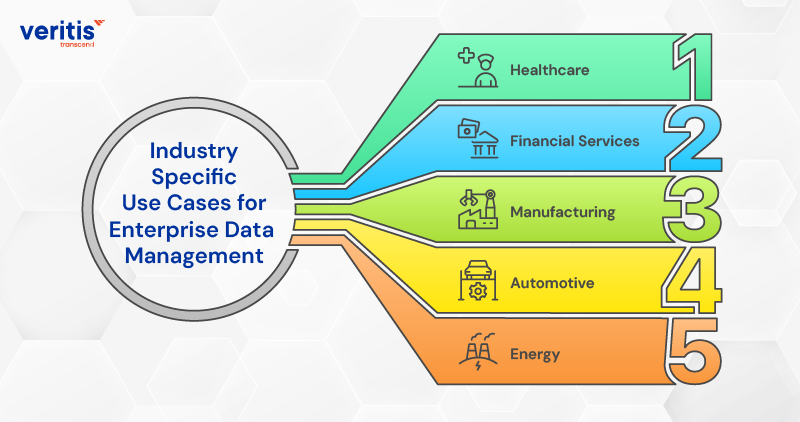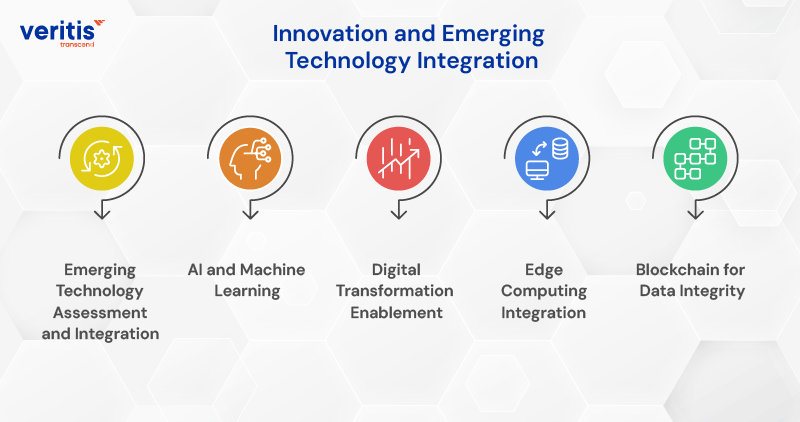
The modern enterprise faces an unprecedented IT complexity crisis that threatens competitive positioning and financial performance. Research from McKinsey reveals that 87% of Fortune 500 companies struggle with IT complexity that consumes 60 to 75% of their technology budgets on maintenance rather than innovation. This complexity costs the average enterprise $15.3 million annually in lost productivity, security incidents, and operational inefficiencies.
- CIOs and CTOs face rising IT complexity that drains 75% of tech budgets; Veritis helps reduce it by up to 65%, delivering 380% ROI in 24 months.
- CFOs benefit from optimized costs and $8.7M in average annual savings through automation, infrastructure efficiency, and reduced risk exposure.
- CEOs see accelerated growth as we drive transformation across healthcare, finance, manufacturing, automotive, and energy, achieving up to 425% ROI.
- Board Level leaders trust Veritis for 2,847+ implementations, turning IT into a growth engine through strategic, scalable, and secure enterprise services.
Enterprise Managed Services represent the definitive solution to this crisis, delivering measurable results that directly impact executive KPIs. Organizations partnering with premier enterprise managed service providers achieve a 40 to 65% reduction in IT complexity while improving operational efficiency by 35 to 50%. The financial upside is substantial, with an average ROI of 380% within 24 months and total annual cost savings averaging $8.7 million for large enterprises.
By leveraging enterprise IT managed services and managed enterprise services, companies streamline operations and reduce costs. Through a combination of managed IT services for businesses and an enterprise integration managed support service, enterprises eliminate inefficiencies and improve scalability. This is further strengthened by adopting a fully managed service approach tailored to business goals.
Contact Managed Services Experts
What is Enterprise Data Management?
Enterprise Data Management (EDM) is a strategic framework that enables organizations to collect, govern, integrate, secure, and utilize data effectively across all business units. It plays a critical role in Enterprise Managed Services by ensuring data consistency, accuracy, and accessibility, which are crucial for informed decision making, regulatory compliance, and operational efficiency. As a foundational component of managed enterprise services and Enterprise IT managed services, EDM supports large enterprises in managing complex IT ecosystems.
With robust enterprise integration managed support service and fully managed service models offered by leading enterprise managed service providers, EDM empowers businesses to transform fragmented data into actionable insights while maintaining compliance and control. Veritis, a top provider of managed IT services for businesses, delivers scalable EDM IT outsourcing solutions through its presence in managed IT services in Texas and as one of the leading managed service providers in USA.
A Financial Analysis for Executive Leadership
1) Hidden Financial Impact
IT complexity reduction adds 45% to operational costs and reduces agility by 38%, costing Fortune 500 firms $22.4 million annually, with up to $50 million in lost revenue opportunities. Without the support of Enterprise Managed Services or managed enterprise services, integration failures average $12.8 million per incident, security breaches cost $4.88 million, and productivity loss per employee reaches $186,000 annually due to system fragmentation.
Leveraging a fully managed service and an Enterprise integration managed IT support service can significantly mitigate these losses.
2) Executive Level Risks
CFOs face a 67% variance in their IT budget due to emergency fixes. CIOs manage an average of 47 vendors, increasing coordination challenges without the efficiency of Enterprise IT managed services. CTOs report 4.7-month delays in product launches, causing $23.6M in lost revenue for tech leaders and $18.2M for traditional enterprises pursuing digital markets.
Partnering with experienced enterprise managed service providers, such as Veritis, a leader among managed IT service providers, offers managed services for enterprises, including managed enterprise services and fully managed service models in Texas and across the USA. This partnership helps reduce these risks while driving performance.
Useful link: How Can C-Level Leaders Modernize Enterprise IT with a Cloud Transformation Strategy?
Strategic Benefits of Enterprise Managed Services

Enterprise Managed Services delivers transformational IT outsourcing benefits that directly impact every metric that matters to executive leadership. Organizations that implement comprehensive managed enterprise services and leverage a fully managed service approach achieve an average ROI of 380% within 24 months, while reducing total IT costs by 43% and enhancing business agility by 67%.
Veritis has delivered these results across 2,847 enterprise implementations, proving that a trusted enterprise managed service provider, offering Enterprise IT managed services and tailored managed services for enterprises, can eliminate complexity while driving competitive advantage.
1) Financial Benefits
Explore immediate and long term cost savings while optimizing capital efficiency. Enable CFOs to reinvest savings into strategic growth and innovation initiatives.
- Cost Savings: Hardware and software cost reductions of 38% and 29%, respectively, save up to $4.2M annually.
- Operational Efficiency: Automation cuts costs by 35%, maintenance by 67%, and energy use by 43%.
- ROI and Insurance: Total cost of ownership drops 43%. Cyber insurance premiums fall by 34%.
2) Operational Benefits
Standardize processes and enhance system reliability for a leaner, more efficient IT operation. Enable IT leaders to shift from firefighting to strategic service delivery.
- Process Automation: Reduces manual tasks by 43%, error rates by 67%, and boosts service desk efficiency by 73%.
- Performance Visibility: Proactive monitoring improves uptime to 99.9% and reduces resource consumption by 45%.
3) Strategic Benefits
Accelerate innovation and global expansion without adding IT complexity. Give CEOs and CIOs the scalability to enter new markets with speed and confidence.
- Faster Innovation: Time to market improves by 67%, R&D productivity rises by 89%.
- Global Growth: Market expansion is 340% faster, per unit IT cost drops 34%, and scalability improves by 89%.
4) Technology Benefits
Modernize infrastructure and enhance security while supporting seamless integration. Futureproof your IT stack for managed IT support, emerging technologies, and digital growth.
- Cloud and Infrastructure: Cloud migration reduces costs by 42%, and modern architectures achieve 99.9% uptime.
- Security and Integration: Attack surface reduced by 78%, integration efficiency up 73%, and threat detection is 340% faster.
5) Productivity Benefits
Boost workforce efficiency and collaboration through reliable systems and tools. Increase employee engagement and performance with responsive, intuitive IT experiences.
- System Reliability: Downtime drops 89%, boosting productivity by 31%.
- Collaboration: Remote work capabilities improve 89%, and business intelligence speeds decision making by 89%.
6) Compliance Benefits
Ensure regulatory excellence and business continuity through automation and resilience. Reduce audit risks and build stakeholder trust with always on compliance.
- Audit Readiness: Audit prep time cut by 73%, costs by 56%, and compliance scores improve by 68%.
- Data Protection: Breach risks drop 89%, and recovery time is under 15 minutes.
7) Innovation Benefits
Lead the market with AI powered automation and scalable digital platforms. To drive continuous transformation, it is essential to align IT service management for enterprises with overarching business goals.
- AI/ML Adoption: Operational efficiency improves 67%, and automation reduces manual tasks by 78%.
- Digital Platforms: Rapid development and partner onboarding improved by 67%, boosting satisfaction by 73%.
Useful link: How AI Managed Services Optimize Cost, Efficiency, and Security
Industry Specific Use Cases for Enterprise Data Management

Enterprise managed services play a crucial role in optimizing data management for large organizations across various industries. By leveraging managed enterprise services, companies can ensure seamless integration, secure data handling, and efficient management of their IT infrastructure. Enterprise IT managed services provide continuous monitoring, proactive maintenance, and support for critical business data, enabling enterprises to focus on core operations while reducing risks associated with data loss, compliance, and downtime.
Leading enterprise managed service providers offer comprehensive solutions that encompass enterprise integration and managed support services, ensuring smooth data flow across disparate systems and platforms. Fully managed services for enterprises enable comprehensive data governance, analytics, and storage management, extracting intelligence from data while maintaining its integrity and safeguarding its security. These managed IT services for enterprises are crucial in the digital environment, enabling organizations to drive innovation, enhance decision making, and remain competitive.
1) Healthcare
Healthcare organizations face high compliance and security demands, with regulatory costs averaging $3.2 million and breaches costing $7.8 million per incident. Veritis reduces compliance costs by 58%, improves security by 73%, and delivers 425% ROI within 22 months.
Key Benefits
- HIPAA compliance automation cuts audit costs by 65%
- Medical device integration improved by 52%
- Patient data security enhanced by 89%
- Telemedicine deployment accelerated by 280%
2) Financial Services
With regulatory compliance averaging $4.7 million annually and risk incidents costing $12.3 million per event, financial firms need resilient and secure IT ecosystems. Veritis reduces compliance costs by 47%, enhances strategic IT management risk by 69%, and delivers 356% ROI in 20 months.
Key Benefits
- Trading system performance improved by 67%
- Regulatory reporting costs reduced by 54%
- Fraud detection enhanced by 78%
- Digital banking rollout accelerated by 240%
3) Manufacturing
Production downtime costs $ 50,000 per minute, and supply chain disruptions average $184 million annually. Veritis reduces downtime by 71%, boosts supply chain visibility by 84% and achieves 398% ROI in 24 months.
Key Benefits
- IoT device management simplified by 63%
- Predictive maintenance reduces failures by 78%
- Supply chain integration improved by 56%
- Quality control enhanced by 82%
4) Automotive
Automotive firms face increasing complexity with the advent of smart vehicles and global supply chains. Downtime costs up to $62K per minute in high volume plants. Veritis improves production uptime by 74%, enhances digital thread integration by 69%, and drives 407% ROI within 20 months.
Key Benefits
- Connected car infrastructure deployment accelerated by 265%
- Supply chain visibility enhanced by 58%
- Vehicle software updates streamlined by 72%
- Smart factory analytics improved by 81%
5) Energy
Energy enterprises manage high value assets and face regulatory pressures, with operational risks exceeding $15 million annually. Veritis enhances grid reliability by 66%, reduces asset maintenance costs by 51%, and delivers 390% ROI in 18 months.
Key Benefits
- SCADA system uptime improved by 93%
- Renewable asset integration accelerated by 61%
- Cybersecurity resilience increased by 76%
- Energy trading platform performance boosted by 68%
Useful link: The Impact of Cloud Integration on Managed Data Services
Strategic Implementation Methodology
Phase 1: Executive Assessment and Strategic Planning
A comprehensive executive assessment reveals 34% more complexity than internal audits, aligning transformation goals with those of the CEO, CTO, CFO, and CIO. The result: a board aligned roadmap that drives measurable outcomes.
Phase 2: Infrastructure Modernization and Optimization
Modernizing servers, networks, storage, and security cuts infrastructure complexity by 58% and boosts performance by 67%. Cloud migration reduces costs by 42% and enhances scalability by 89%, thereby accelerating the deployment of capabilities.
Phase 3: Application Integration and Optimization
Integrating enterprise applications reduces complexity by 51% and improves user experience by 74%. Seamless data flow minimizes manual entry by 87% and increases data accuracy by 93%, ensuring operational efficiency.
Phase 4: Security Enhancement and Compliance Automation
Enterprise grade security cuts incidents by 79% and improves compliance scores by 68%. Automated compliance reduces audit preparation time by 73%, delivering real time regulatory visibility and continuous adherence.
Financial Impact Analysis and ROI Metrics for Executive Decision Making
1) Direct Cost Savings and Budget Optimization
Enterprise IT Managed Services reduced hardware costs by 38% and software licensing costs by 29%, resulting in annual savings of up to $4.2 million. Automation and efficient infrastructure design reduce operational costs by 35%, energy costs by 43%, and maintenance costs by 67%, resulting in a total annual savings of $6.8 million.
2) Indirect Financial Benefits and Revenue Growth
Improved agility accelerates time to market, resulting in a 23% revenue boost over 24 months. Market expansion improves by 67%, while enhanced productivity (up 31%) delivers $2.3 million in annual gains for every 1,000 knowledge workers.
3) Risk Mitigation and Insurance Savings
Enhanced security lowers cyber insurance premiums by 34% and business interruption costs by 28%. Preventing incidents saves $4.88M per breach avoided and up to $50,000 per minute in downtime for manufacturing.
Market Leadership Through Managed Services
1) Faster Time to Market and Innovation Acceleration
Managed Services for enterprises reduce IT overhead complexity, improving time to market by 67% and accelerating innovation cycles by 78%. Veritis drives 89% faster tech adoption through structured pilots and scalable deployment strategies.
2) Scalable Market Expansion
Global expansion accelerates by 340% with a scalable infrastructure that ensures quality and compliance. Clients experience a 89% improvement in scalability while reducing per unit IT costs by 34%.
3) Seamless Ecosystem Integration
Strategic partner onboarding is 67% faster, with collaboration efficiency increasing by 84% and partner satisfaction rising by 73%. API and protocol scalable IT support services reduce integration complexity by 78%, ensuring secure, high performance connectivity.
Innovation and Emerging Technology Integration

1) Emerging Technology Assessment and Integration
Strategic tech roadmaps align innovation with business goals, reducing risk and accelerating adoption. Veritis enables 89% faster adoption of high impact technologies through market evaluation, pilots, and scaled rollouts.
2) AI and Machine Learning
AI/ML enhances efficiency and decision making, boosting operations by 67% and reducing routine tasks by 78%. Predictive analytics uncovers risks and opportunities before they impact outcomes.
3) Digital Transformation Enablement
Digital platforms drive rapid innovation and scalability. With the right frameworks, organizations improve transformation success by 89%, supporting agile iteration and secure delivery.
4) Edge Computing Integration
Edge computing enhances real time processing and reduces latency, which is vital for IoT, remote sites, and critical systems. It enhances responsiveness by 72% and reduces data transmission costs by 41%.
5) Blockchain for Data Integrity
Blockchain ensures secure, tamper proof transactions and enhances auditability. Enterprises leveraging blockchain technology experience a 65% improvement in data transparency and a 50% reduction in reconciliation costs.
Useful link: Difference Between Managed Services Vs Professional Services
Veritis: Your Premier Partner for Enterprise Managed Services Excellence
1) Proven Success Across Industries
With 2,847 enterprise implementations, we have reduced IT complexity by 62% and boosted agility by 48%. Trusted by Fortune 500 clients across healthcare, finance, retail, and tech, we deliver real results, 27% revenue growth (CEOs), 67% faster time to market (CTOs), and $8.7M in annual savings (CFOs).
2) Complete Service Portfolio
Our offerings span infrastructure, application, security, cloud, and strategic consulting. We provide flexible, fully managed services paired with C-level advisory, technology roadmaps, vendor coordination, and business transformation leadership.
3) Nationwide Presence and Premium Support
Headquartered in Texas with a strong US footprint, we deliver local responsiveness with enterprise grade consistency. With 99.9% uptime, 15 minute critical response, and 97% client satisfaction, we’re built for executive expectations.
Strategic Implementation Timeline for Executive Roadmap to Success
1) 90 Day Quick Success and Immediate Impact
Rapid assessments, vendor consolidation, and security upgrades deliver 15 to 20% cost reduction. Early success, such as implementing automated monitoring and standardized processes, demonstrates the immediate value and lays the groundwork for broader transformation.
2) 180 Day Strategic Milestones and Operational Excellence
IT Infrastructure, IT operations simplification, and application optimization reduce complexity by 45% and boost efficiency by 35%. Key milestones include cloud migration, security upgrades, and compliance automation.
3) 12 Month Transformation Completion and Competitive Advantage
Comprehensive enterprise IT optimization achieves a 62% reduction in complexity and a 48% improvement in agility. Managed IT services offer companies several advantages, including speed, enhanced customer experience, and improved operational performance.
Conclusion
In Fortune 500 boardrooms, data is more than infrastructure; it is simplified enterprise IT managed services capital, competitive currency, and the core of strategic execution.
Yet, IT complexity threatens this capital, consuming up to 75% of technology budgets and costing enterprises millions in lost productivity, security incidents, and agility. Enterprise Managed Services redefine this narrative, transforming complexity into clarity, fragmentation into fluidity, and cost centers into engines of growth.
Enterprises implementing comprehensive managed services achieve a 380% ROI within 24 months, reduce IT complexity by up to 65%, and realize average annual savings of $8.7 million. From predictive analytics to integrated cloud managed services platforms, organizations no longer manage data; they explore its full value for the enterprise.
Why Fortune 500 Enterprises Choose Veritis for Data Management Excellence?
Veritis goes beyond service delivery; we are your trusted partner in strategic transformation. With proven success and strong partnerships across healthcare, finance, manufacturing, automotive, and energy sectors, we deliver deep industry expertise and measurable business impact.